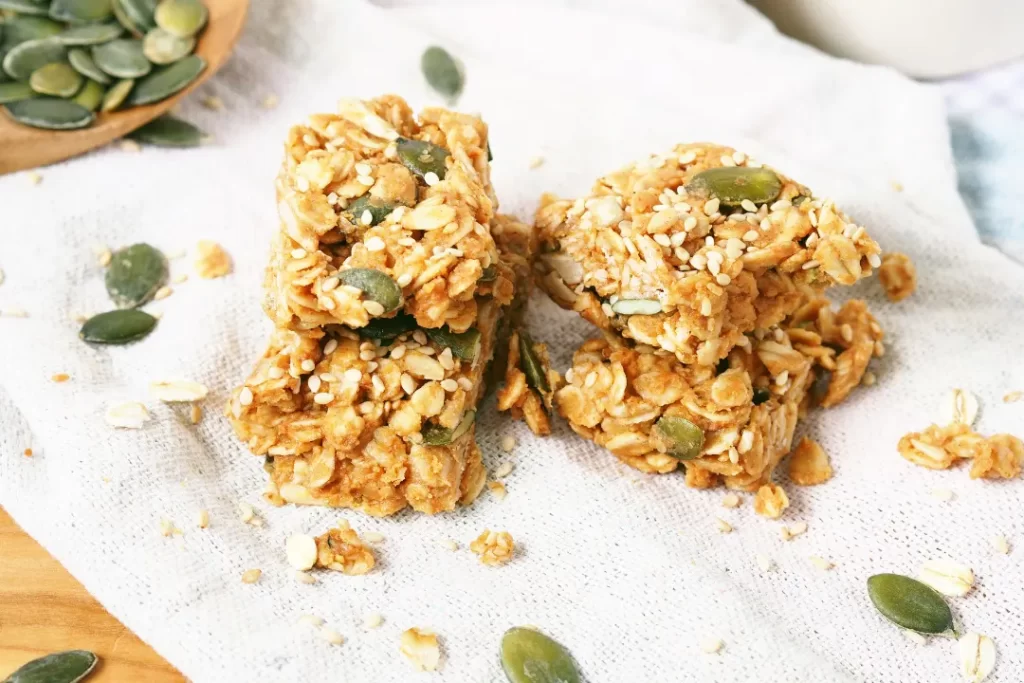Whether you’re looking for a meal replacement or a quick energy boost after a workout, a protein bar can give you the pick-me-up you need. In this article, we do a head-to-head comparison of two meal replacement bars, each of which is well-regarded in a competitive marketplace. Read on to learn more about how Kirkland Protein Bars stack up against the vegan-friendly protein bars offered by Healthy Truth.
Looking to add more calcium, potassium, fiber, iron, and protein to your diet – without adding sugar? Protein bars are more than just a quick snack. They help you gain muscle and lose weight. And you no longer have to settle for protein bars filled with meat or dairy products to reap the benefits. Let’s whey your options.
You May Also Like:
5 Best Superfood Snacks: Nutrient-Dense Performance Boosters
Vitamin K: 5 Great Benefits of This Little-Known Essential Vitamin
Kirkland Protein Bars VS Healthy Truth Plant-Based Protein Bars is an original (HisHealthMag) Article.
Why eat a protein bar?
Few people take time to eat a healthy breakfast or even lunch, for that matter. Our busy schedules have most of us grabbing a cup of coffee for that morning boost and maybe something worse, like a donut or granola bar. While a granola bar may provide some of the protein you need to get you through the day, most contain fillers and a lot of sugar.
Whether you choose Kirkland protein bars or Healthy Truth Plant-Based protein bars, it’s crucial to consider several factors:
Ingredients: Is it full of processed or raw ingredients? Processed foods like whey powders can make you feel sluggish – quite the opposite of what you’re trying to achieve. Whey protein can also make all the other proteins harder to absorb.
Vegan-friendly: A plant-based bar has lots of protein, some fiber, few carbohydrates, and no added sugar. Natural sweeteners contained in fruit are much better for you.
Calories: A nutritious protein bar should be under 300 calories.
Fats: A good protein bar shouldn’t have any trans fats and should contain less than 3 grams of saturated fats.
Enough Protein: A good protein bar contains at least 10 grams of protein – 18 grams if you’re trying to build muscle.
Taste: Even the most nutritious protein bar isn’t worth the calories if you don’t enjoy it.

Kirkland protein bars vs Healthy Truth plant-based protein bars:
Ingredients
Kirkland protein bars come in four varieties: chocolate chip cookie dough, chocolate peanut butter chunk, chocolate brownie, and cookies & cream. Each contains a blend of milk protein, whey protein isolate, tapioca starch, sea salt, unsweetened chocolate, soluble corn fiber, sunflower lecithin, and stevia (a sugar-free, natural sweetener.) While Kirkland protein bars are kosher and gluten-free, they are not dairy-free and are, therefore, not vegan friendly. These bars also contain a number of processed ingredients to extend their shelf life.
Healthy Truth plant-based protein bars are available in five varieties: cacao, mixed berry, blueberry cobbler, orange cranberry, and vanilla. These bars are one of the only raw bars on the market. They’re plant-based, so the sweetness comes from dates and coconut nectar. They also contain vanilla extract, pea protein powder, sprouted pumpkin seeds, sacha inchi protein powder, MCT oil, and ground flaxseed. You’ll find blueberry powder and cranberry orange powder in the fruit varieties. They are gluten and dairy free.

Calories and fats
Kirkland protein bars average 190 calories for a 2.12-ounce bar. Each has 6 grams of total fat and 1.5 grams of saturated fat. While often touted as a meal replacement, the added preservatives in these bars often leave you hungry.
Healthy Truth plant-based protein bars average 290 calories, but the bars are bigger at 2.3 ounces. Each bar contains no trans fats and 3 grams of saturated fat. These bars stand up better as a meal substitute.
Protein
Kirkland protein bars average 20 grams of protein, but the protein comes from artificial additives such as milk protein concentrate and whey protein isolate. Nutritionists prefer you get your protein from fruits, vegetables, and nuts.
Healthy Truth plant-based protein bars contain 17 grams of protein – all of it natural, so it stays with you longer.
Taste
This is where Healthy Truth plant-based protein bars stand out. Not only are they more filling, but customers give them rave reviews when it comes to taste. Some reviews complain Kirkland protein bars taste a little grainy. That could be because the manufacturers stuff each bar with 10 grams of fiber. Yes, fiber is good, but too much all at once can have negative side effects, such as constipation, bloating, cramping, and gas. It also affects the taste of the protein bar.
Final verdict
Kirkland protein bars are made by Costco as the retail giant’s attempt to provide a healthy alternative to junk food, so the bars are much like any generic product. They cost less (about $1.25 per bar) compared to Healthy Truth’s plant-based protein bars, which cost about $3.50 apiece. But customer reviews and our own taste buds prove you get what you pay for. We paid close attention to the reviews from vegans. When asked if they wanted milk products in their protein bars, their response was, “No whey!”

Further Reading For Additional Reference:
Time.com: Is Granola Healthy?
Livestrong.com: Difference Between an Energy Bar and a Granola Bar
Henry Ford Health: Fats in Your Diet: The Good, the Very Good, and the Bad
International Journal of Pharmaceutical Sciences and Research: Artificial Preservatives and Their Harmful Effects
Important Note: The information contained in this article (Kirkland Protein Bars VS Healthy Truth Plant-Based Protein Bars) is for general informational purposes only, and should not be construed as health or medical advice, nor is it intended to diagnose, prevent, treat, or cure any disease or health condition. Before embarking on any diet, fitness regimen, or program of nutritional supplementation, it is advisable to consult your healthcare professional in order to determine its safety and probable efficacy in terms of your individual state of health.
Regarding Nutritional Supplements Or Other Non-Prescription Health Products: If any nutritional supplements or other non-prescription health products are mentioned in the foregoing article, any claims or statements made about them have not been evaluated by the U.S. Food and Drug Administration, and such nutritional supplements or other health products are not intended to diagnose, treat, cure, or prevent any disease.




